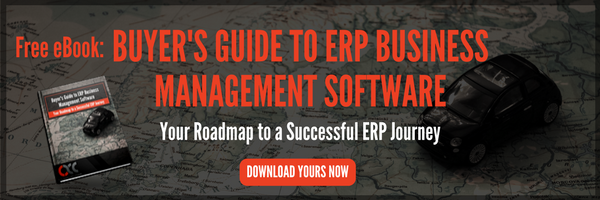There are tons of misconceptions about ERP out there. In our blog post, “What is ERP?” we touched on a few but didn’t outright address them. Now, we’d like to tackle these misconceptions head-on. Before making a decision about whether ERP is right for your business, consider these 5 common misconceptions about ERP systems.
- ERP Software Is Accounting Software
Often, the terms “ERP software” and “accounting software” are used interchangeably. Think of an ERP solution as a collection of legos with pieces that can be fit together when needed or left out when unnecessary. The accounting lego almost always comes with the starter pack. It is a subset of any ERP bundle, but accounting is far from the extent of a modern ERP’s functionality. In fact, other fairly standard subsets of modern ERP bundles include order fulfillment, invoicing, inventory management, production management, job costing, reporting, eCommerce, Human Capital Management, Customer Relationship Management, and more! ERP should be thought of as a system of record that can integrate with specialized third-party products, making the boundaries of modern ERP limitless.
- ERP Is Too Expensive For Small Companies
As the name may indicate, in the past, ERP systems had such a high price tag that they were often only a realistic solution for enterprise or large businesses. ERP implementations required huge onsite IT infrastructures and often costly customizations (see #3). However, with the adoption of SaaS and cloud technology, smaller companies can leverage the same robust ERP solutions that larger enterprises have enjoyed for decades. Cloud computing and the Software as a Service (SaaS) model have significantly reduced up-front acquisition and implementation costs and allowed for subscription licensing to minimize upgrade and maintenance costs. After all, it’s not just large companies that need the functionality of ERP. Small businesses, especially those expecting growth, need the support of an agile solution that can scale with them as their needs grow.
- ERP Software Requires Costly Customizations
In the past, customization in ERP meant spending lots of time and money to alter source codes. With business conditions, processes and models more fluid than ever, no business can afford to spend such vast amounts of time and resources in order to implement change. However, modern ERP is much more easily configured to individual needs without coding. Similarly, adding functionality to an ERP system used to be much more difficult than it is with modern ERP systems. API’s are the way forward for adding functionality to ERP systems. Whether your solution is cloud-based, on-premise or hybrid, the ability to externalize customization through API compatibilities is of growing importance as the multi-cloud world grows every day.
- One Size Fits All
A properly implemented ERP system is like a finely tailored suit. First, you choose the suit, in this case, the ERP vendor. The belief that all ERP vendors are largely the same is one of the greatest misconceptions out there. ERP solutions vary in terms of functionality, licensing, deployment, available API integrations, User Interface, and more. After you pick the ERP vendor that is the best fit for your needs, it’s time to get that suit tailored so that it really fits. The processes an ERP runs are typically very different between companies, even companies in the same industry. No two businesses are the same, and so no two businesses need exactly the same ERP system. As mentioned in #3, tailoring modern ERP to a specific business’ processes is often able to be done without touching source-code.
- ERP Projects Don’t Deliver ROI
ERP is a software or platform, but not a project (though the implementation can be considered a project). ERP allows for continuous improvement that requires a sustainable change in mindset, strategies, and behaviors. ERP improves business practices and reduces inefficiencies. It doesn’t print money, but it shows you where to find it by making business data easily accessible. That being said, it’s necessary to ensure that the end-user has the knowledge and tools to sustain the change made possible through the implementation process in order to safeguard data quality. The software can only do so much if the end-user isn’t using it properly. It’s important to have all employees engaged throughout the implementation process, trained properly in how to use the software and ready to embrace sustainable change. Focus on benefits that are ERP-enabled, not just inherent in the system.
Please, let us know if we missed any common misconceptions about ERP solutions! If you’d like to learn more about ACC’s Consulting, ERP Implementation, Training, or Support services contact us today!
